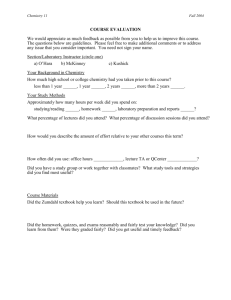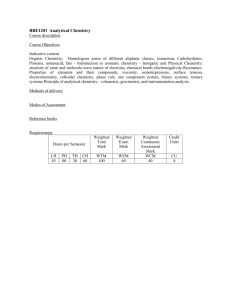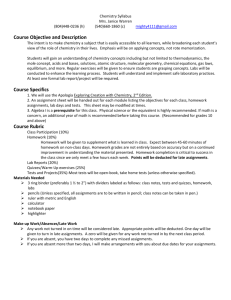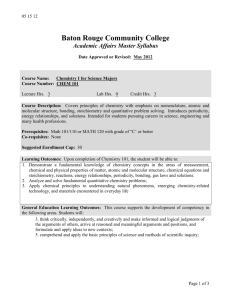AP- Chemistry Fall 2007 Syllabus
advertisement
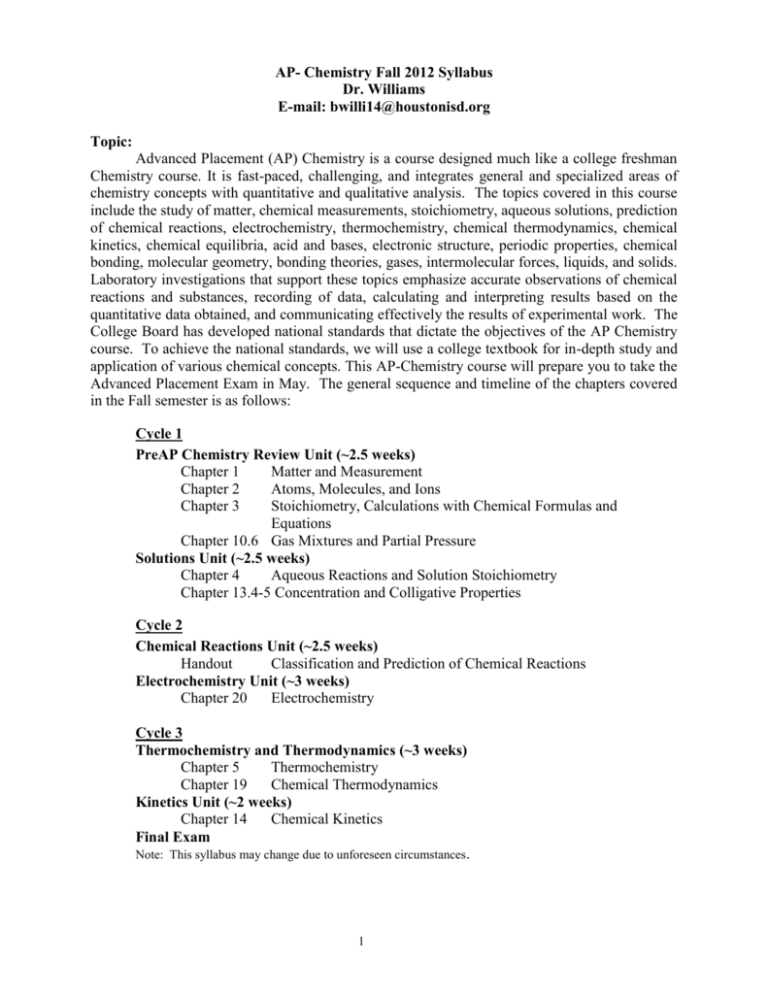
AP- Chemistry Fall 2012 Syllabus Dr. Williams E-mail: bwilli14@houstonisd.org Topic: Advanced Placement (AP) Chemistry is a course designed much like a college freshman Chemistry course. It is fast-paced, challenging, and integrates general and specialized areas of chemistry concepts with quantitative and qualitative analysis. The topics covered in this course include the study of matter, chemical measurements, stoichiometry, aqueous solutions, prediction of chemical reactions, electrochemistry, thermochemistry, chemical thermodynamics, chemical kinetics, chemical equilibria, acid and bases, electronic structure, periodic properties, chemical bonding, molecular geometry, bonding theories, gases, intermolecular forces, liquids, and solids. Laboratory investigations that support these topics emphasize accurate observations of chemical reactions and substances, recording of data, calculating and interpreting results based on the quantitative data obtained, and communicating effectively the results of experimental work. The College Board has developed national standards that dictate the objectives of the AP Chemistry course. To achieve the national standards, we will use a college textbook for in-depth study and application of various chemical concepts. This AP-Chemistry course will prepare you to take the Advanced Placement Exam in May. The general sequence and timeline of the chapters covered in the Fall semester is as follows: Cycle 1 PreAP Chemistry Review Unit (~2.5 weeks) Chapter 1 Matter and Measurement Chapter 2 Atoms, Molecules, and Ions Chapter 3 Stoichiometry, Calculations with Chemical Formulas and Equations Chapter 10.6 Gas Mixtures and Partial Pressure Solutions Unit (~2.5 weeks) Chapter 4 Aqueous Reactions and Solution Stoichiometry Chapter 13.4-5 Concentration and Colligative Properties Cycle 2 Chemical Reactions Unit (~2.5 weeks) Handout Classification and Prediction of Chemical Reactions Electrochemistry Unit (~3 weeks) Chapter 20 Electrochemistry Cycle 3 Thermochemistry and Thermodynamics (~3 weeks) Chapter 5 Thermochemistry Chapter 19 Chemical Thermodynamics Kinetics Unit (~2 weeks) Chapter 14 Chemical Kinetics Final Exam Note: This syllabus may change due to unforeseen circumstances. 1 Textbook and Resources: Brown, Theodore L., H. Eugene LeMay, Jr., and Bruce E. Bursten. Chemistry: The Central Science, 8th ed. Upper Saddle River, NJ: Prentice Hall, 2000. Jones, Kristen H. Writing AP Equations, Handout developed at A&M Consolidated High School, College Station, TX: obtained during the AP Chemistry Summer Institute at Rice University, 2004. Quest Learning & Assessment™, College of Natural Sciences, The University of Texas at Austin, 2011 Class Rules: 1. Be in your assigned seat when the tardy bell rings. 2. Bring all materials daily. This includes your required supplies, book, and homework assignments. 3. Be courteous and respectful to others. Give your full attention to others in discussions. Raise your hand and wait for acknowledgment before speaking. Respect the properties of other students, the teacher, and the school. Remain in your assigned seat unless you have permission to get up. 4. Be productive and participate in class. Ask questions, contribute to the answer, and play an active role in the laboratory exercises. 5. Follow the teacher’s directions the FIRST time they are given. This rule is especially important during the laboratory exercises. 6. No food or drink is allowed during class. Penalties for choosing to break a rule. First Offense: Verbal warning. Second Offense: Personal conference with the teacher. Third Offense: Detention, completion of an action plan, and telephone call home Fourth Offense: Detention, complete or revise your action plan and parent/student/teacher conference. Fifth Offense: Referral to the principal Grading Policy: Tests / Projects 60% Labs / Quizzes 30% Class participation 10% (Includes daily work and homework) For tests, at least three school days advanced notice will be given. Tests will be over textbook material, homework, laboratory assignments, and lectures. Graded tests will be returned to you for review in class and cannot be taken outside of my classroom. You are welcome to further review your tests in my classroom at a later date, but only after making an appointment with me. If you fail a test, then you may have an opportunity to retake a similar assessment covering the same topics. If you choose to participate, then you are responsible for requesting and scheduling the retake in writing during the class period that the graded assessment is returned. Retakes must be scheduled for outside regular class time. You must attend one tutorial session before the retake of a test. Once complete, your retake grade will be averaged with the original for a final 2 assessment grade of no higher than “70%”. Retakes are NOT allowed on end of cycle exams and final exams. Quizzes may be announced or unannounced and will be over homework or in-class assignments. Lab reports will be graded. Learning to do problems of all types quickly will be one of the major goals of this class. Homework will be assigned and reviewed on a regular basis and will include textbook problems, UT Electronic Homework (Quest) problems, and/or free-response questions. It is important to complete ALL three types of homework. Textbook problems and UT Homework problems provide both practice in the foundation for each concept and more challenging, higher critical thinking practice. Free-response questions are taken from past AP-Chemistry exams and provide novel, integrative problems. As a general rule, you can count on at least 6 hours of homework each week. Homework credit will be given only if the assignment is complete at the beginning of the class period or submitted on time. Late work may be turned in ONE class day late at the beginning of period, but will receive a maximum score of “70%” or less. No late work will be accepted beyond that time and the assignment will be marked as a zero. All students should maintain a record of their graded assignments. There is no extra credit. I am always glad to meet with you regarding questions about grades or assignments. Please make arrangements for time outside of class with me. Special Activity: AP Chemistry Exam If you effectively work hard in this course, you will be ready for the AP Chemistry exam on Monday morning, May 6, 2013. The exam is not required, but it is highly encouraged. We will talk about the exam all throughout the year. Tutoring/Conferences I are available for classroom tutoring either during scheduled tutorials, at lunch, or after school. To request tutoring, please see me to make arrangements for a convenient time to meet. If at any time you or your parent would like to discuss your progress, please request an individual conference with me by phone (713-741-2410) or E-mail (bwilli14@houstonisd.org) at least one day in advance. 3
